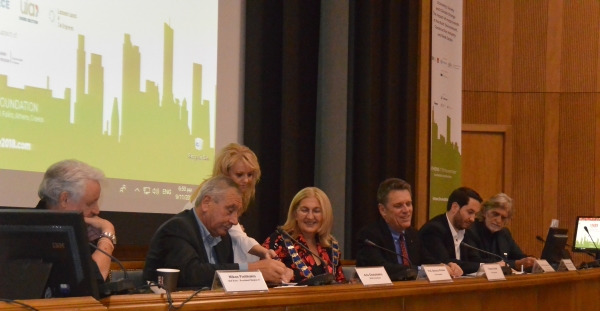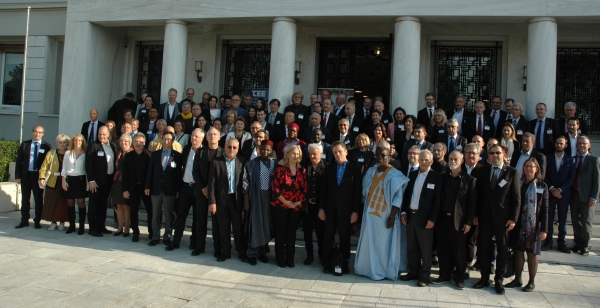News in 2018

|
Cooperation agreement among Surveyors, Civil Engineers and Architects
7-9 November 2018, Athens, Greece

FIG President Chryssy Potsiou signs the cooperation agreement together
with the presidents of UIA and ECCE
At the close of the high-level international conference, TUFE 2018,
on climate, society and economy, FIG President Chryssy Potsiou signed a
wide-ranging cooperation agreement with the International Union of
Architects (UIA) and the European Council of Civil Engineers (ECCE).
The Technical Chamber of Greece, FIG, the Working Party for Land
Administration of the United Nations Economic Commission for Europe
(UNECE-WPLA), the International Union of Architects (Greek Section) and
the European Council of Civil Engineers, had organized this
interdisciplinary conference which took place 7-9 November 2018 in
Athens. They had invited policy makers, senior professional leaders,
academics and relevant professional experts to bring together
experiences and scientific knowledge that would impose setting up land
policies and actions in the fields of sustainable land and real estate
management for the humanity and the economic and legal empowerment of
the poor and for dealing with the impact of climate change and other
mega-trends.
President Potsiou at her opening speech said: “FIG strongly
supports the idea of establishing global partnerships in support of the
UN Sustainable Development Agenda 2030 and its goals. The organization
of TUFE2018 joint conference by TCG, FIG, UIA, ECCE and UNECEWPLA is
within the scope of SDG17. In particular, TCG, as the hosting partner,
wishes to bring together the relevant professionals and their
leaderships to establish a global partnership in support of governments
and society for the better implementation of the sustainable development
Agenda 2030.”
During the three days, trends in the management of land and real
estate, including land administration, land use planning and territorial
justice, heritage preservation, property valuation and taxation,
construction stability and development issues in terms of technology,
environmental friendly and disaster management tools, funding issues,
technical issues such as the blockchain technology and its
potential, the use of crowdsourcing in surveying, as well as educational
and professional aspects were presented. The effect of brain drain on
developing or distressed economies, an effect of growing concern also
within Europe was also on the agenda during the conference.
The presentations and discussions showed an interest and wish among
all organizations and professions to work together to address these
issues, and that all organizations have a responsibility and wish to
jointly work on:
- Increasing capacity among relevant professionals in the private
and public sectors, and in academia, about their role in the digital
society for the good management of land and real estate and for a
sustainable real estate market;
- Building sustainable and robust professions by outlining the
value of architecture, construction quality and reliable and
affordable geospatial information for the safety and well-being of
the people;
Planning for sustainable and affordable cities and establishing
sustainable real estate markets and formalizing the informal real
estate sector;
- Developing multidisciplinary ideas on the impact of the current
and future mega-trends in the built environment, construction
industry and real estate;
- stablishing a closer cooperation for a world free of poverty,
fear and inequality, where life is safe and growth is resilient and
sustainable.
Around 300 Architects, Engineers and Surveyors participated in this
conference (proceedings will be available soon).
Like FIG, the Union of International Architects and the European
Council of civil Engineers, have the UN Sustainable Development Goals on
the agenda, and together the three organizations cover quite many of the
17 goals.
At the closing session FIG President concluded that “FIG has
developed a great experience in issues such as security of tenure,
registration of property rights and property valuation for the legal and
economic empowerment of the poor and the sustainable management of land
and human settlements. During the last 4 years FIG has updated the
cooperation agreement with the World Bank to work jointly in the field
of good management of land and more recently in particular for
establishing sustainable real estate markets. FIG has a long cooperation
with UNECE WPLA in developing joint research and publications in the
field of formalizing informal settlements. FIG has also signed a new
agreement with the International Real Estate Federation FIABCI to
strengthen cooperation and to work on issues of common interest such as
creating sustainable and affordable cities and strengthening the weakest
and emerging real estate markets in formalizing informal settlements.
The signing of this agreement among surveyors (FIG), architects (UIA)
and civil engineers (ECCE) to coordinate activities and develop a common
vision for fields of common interest for the better implementation of
the UN Sustainable Development Agenda 2030 is one more positive step
forward.”

Group photo from the conference TUFE 2018
Chryssy Potsiou and Louise Friis-Hansen
15 November 2018

























